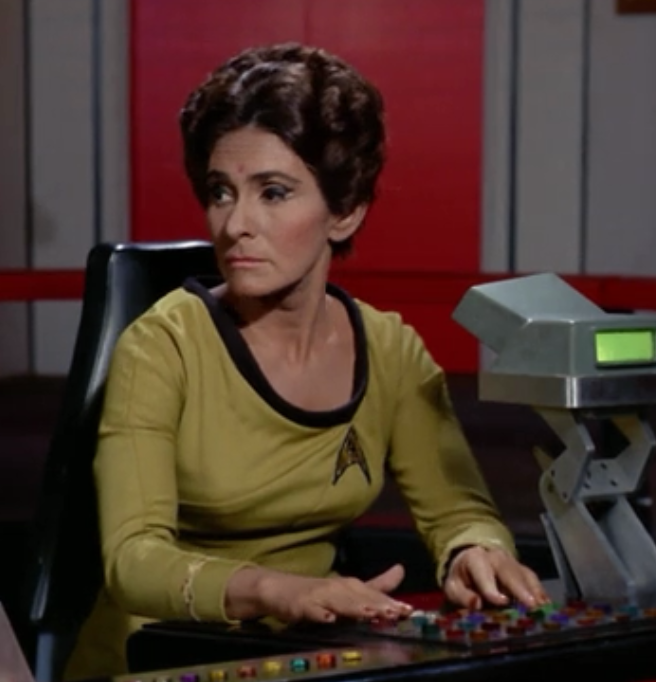Time to share some more great things I’ve been reading that I thought you might be interested in!
- “Star Trek Sex Change: Comic Flips Entire Crew’s Genders” by Alison Flood at The Guardian
- Super exciting to actually be quoted in this article!
- “Boldly Going Where No Man (or Woman) Had Gone Before: How a bunch of nerd girls saved Star Trek from total obscurity” by Devon Maloney at Rookie Mag.
- “Female Star Trek fans [are] among the most active in engaging their sci-fi hobby in creative ways, cosplaying, writing fan-fiction, and producing artwork generally more than their male counterparts,” sociologists Maria and John Jose-Tenuto wrote earlier this year, describing the findings of an international, 8,000-fan survey they conducted back in 2006 to study fandom subcultures. “The strong connection with Star Trek by female fans has its roots in the initial days of fandom when pioneers like Bjo Trimble, Eileen Becker, Elyse Pines, Shirley Maiewski, Devra and Deborah Langsam, and Jacqueline Lichtenberg helped pave the way for many of the same fan activities in existence today”.
- “Star Wars and the 4 Ways Science Fiction Handles Race” by Noah Berlatsky at The Atlantic
I thought this was a really interesting article, outlining what the author, Noah Berlatsky, sees as four main ways Hollywood sci-fi handles race. They are:
- Metaphor (as in The X-Men or TOS’ “Let That Be Your Last Battlefield”
- Tokenism (again, something you can see on Star Trek and Berlatsky argues also applies to Billy Dee Williams as Lando Calrissian)
- Diversity – imagining a world where whiteness is not the default. Berlatsky points out this almost never happens in Hollywood but some SF writers like Ursula K. Le Guin do this frequently
- Direct approach where racial issues in Sci Fi are dealt with “as if they are affected by or continuous with racial struggles in the present”. He cites Hunger Games as an example, where District 11 is presented as a segregated, impoverished black district, implying racial discrimination.
Tom Hawking at Flavorwire has another interesting response that I think is complementary, pointing out the need to better acknowledge the science fiction being created by people of colour.
I think it’s a very fair case to make that creators – especially white people working on Hollywood movies and mainstream TV – should consider why it feels more comfortable to avoid addressing racial issues directly and take action to improve representations of people of colour in terms of quantity and quality.
I do take a bit of issue with Berlatsky saying Uhura “backfired” in TOS because she was too tokenized. Certainly the TOS creators could’ve done more with Uhura, but she was still a hugely important character.
Berlatsky points out the techniques above can each be used well or poorly (For example, I would argue “Let That Be Your Last Battlefield” would be metaphor being used well). Can you think of other ways we see these methods used in Star Trek, for good or bad?
- “Sherlock and the Adventure of the Overzealous Fanbase” by Laurie Penny at the New Statesman
- Specifically about the Sherlock fandom, but loved this excerpt on fanfic in general:
What is significant about fan fiction is that it often spins the kind of stories that showrunners wouldn’t think to tell, because fanficcers often come from a different demographic. The discomfort seems to be not that the shows are being reinterpreted by fans, but that they are being reinterpreted by the wrong sorts of fans – women, people of colour, queer kids, horny teenagers, people who are not professional writers, people who actually care about continuity (sorry). The proper way for cultural mythmaking to progress, it is implied, is for privileged men to recreate the works of privileged men from previous generations whilst everyone else listens quietly.
- “Oh Joy Sex Toy: The Star Trek-Worthy Vibrator” by Erica Moen
- Moen’s product review comic includes a cartoon Captain Janeway discussing masturbation, and contains all kinds of Trek-themed punny innuendo, so of course I had to share. NSFW and likely one of those love-it or hate-it things. (I loved it)
- “Nichelle Nichols to receive Essence Honor” report at StarTrek.com
- “Shatner, Fillion, Nichols, Tennant, Gaiman, & More Set For BBC America’s Real History of Science Fiction” report at The Mary Sue











